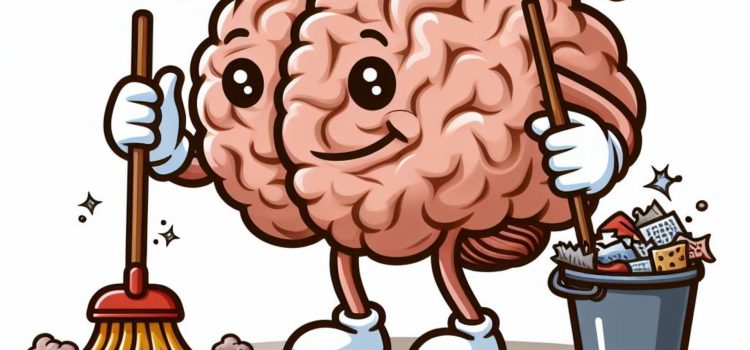
What does it mean to declutter your mind? How does disorganization prevent you from living your dream life?
You’re fully capable of living the life you want, according to Sarah Knight in Get Your Sh*t Together. You just need to get your life together by figuring out what you actually care about, which is a process called “mental decluttering.”
Let’s look at how mental decluttering works.
What Does It Mean to Get Your Sh*t Together?
According to Knight, there are two parts to having your shit together. Part one is about figuring out what you give a shit about and letting go of the rest, and part two is about organizing that shit.
Knight’s first book, The Life-Changing Magic of Not Giving a F*ck, is a deep dive into part one of the process—what Knight calls “mental decluttering.” She explains that every person has only a certain amount of time, energy, and money (or f*cks) to give. Mental decluttering is about figuring out what you actually care about and then discarding the rest. In short, give fewer f*cks.
(Shortform note: The Life-Changing Magic of Not Giving a F*ck was inspired by Marie Kondo’s best seller The Life-Changing Magic of Tidying Up. Knight’s book is described as “a practical parody” of Kondo’s work. While Kondo focuses on physical decluttering, Knight applies the concept to mental decluttering, helping people to rid themselves of unwanted obligations, shame, and guilt.)
Get Your Sh*t Together explores part two of Knight’s process—organizing the shit that you do give a f*ck about to make sure you have the time, energy, and money necessary to do what you need to do and what you want to do.
Who Needs to Get Their Shit Together?
According to Knight, not having your shit together is a state of being, not a character flaw. The likelihood is that most people need to get their shit together in some way. (We’ve all been there at some point in our life.)
She explains that not having your shit together exists on a spectrum. At one end of the spectrum, you have disorganized people who live in a state of chaos. In the middle of the spectrum, you find people who function relatively well day-to-day but never address bigger issues or long-term goals. At the other end of the spectrum, there are people who seem like they have their shit together—they’re organized, productive, and seemingly successful. However, they’re also unhappy and overwhelmed. Knight argues that no matter where you fall, you can benefit from getting your shit together in some way.
(Shortform note: On the spectrum of not having your shit together, Knight focuses on a general population that struggles with common disorganization, procrastination, and goal-setting. The spectrum doesn’t include clinically diagnosed disorganized behavior often associated with schizophrenia. Clinical disorganized behavior can include inconsistent and self-contradictory actions, unpredictable agitation, inappropriate emotional reactions, disorganized speech, and excessive or unusual movements. People showing symptoms of clinical disorganized behavior should seek professional help.)
Why Should You Get Your Shit Together?
According to Knight, getting your shit together is the key to crafting your best life, one that’s dictated by your own standards and not by external expectations. She argues that effectively managing your responsibilities and tasks ensures that you can efficiently do what you need to do, which gives you the freedom and peace of mind to spend time doing what you want to do. It’s not just about ticking off items on a to-do list but about creating a life where your obligations don’t overwhelm your aspirations. According to Knight, if you have your shit together, you can live life on your own terms and shape your days so that they align with your personal values and goals.
(Shortform note: Like Knight, entrepreneur and life coach Tim Ferriss believes that everyone should be able to live their life according to their own values and goals. However, Ferriss advocates for a more radical approach than Knight. In The 4-Hour Workweek, Ferriss explains how you can use elimination, automation, and delegation to reduce the traditional 40-hour workweek to only four hours. By comparison, Knight’s suggestions don’t require a radical lifestyle overhaul and focus more on methodical management of your responsibilities and obligations.)
Is It Worth It?
Knight acknowledges that change can be hard, but she also doesn’t accept that as an excuse for not changing. She encourages you to harness the power of negativity by using your discontent and frustration as motivation. She explains that the prospect of ending your current unhappiness is likely more motivating than your theoretical future happiness. Is what frustrates you worse than the work it will take to make a change? According to Knight, if you don’t want to change, then the situation probably isn’t that bad, and you should stop complaining about it.
(Shortform note: Knight’s emphasis on the “power of negativity” contrasts with the prevailing principles of positive psychology, which promotes harnessing positive emotions and strengths to enhance resilience and well-being. For example, in Flourish, Martin Seligman argues that positive emotion is one of the core pillars of well-being. Seligman suggests positivity, not negativity, is an essential motivator for personal and professional growth.)






